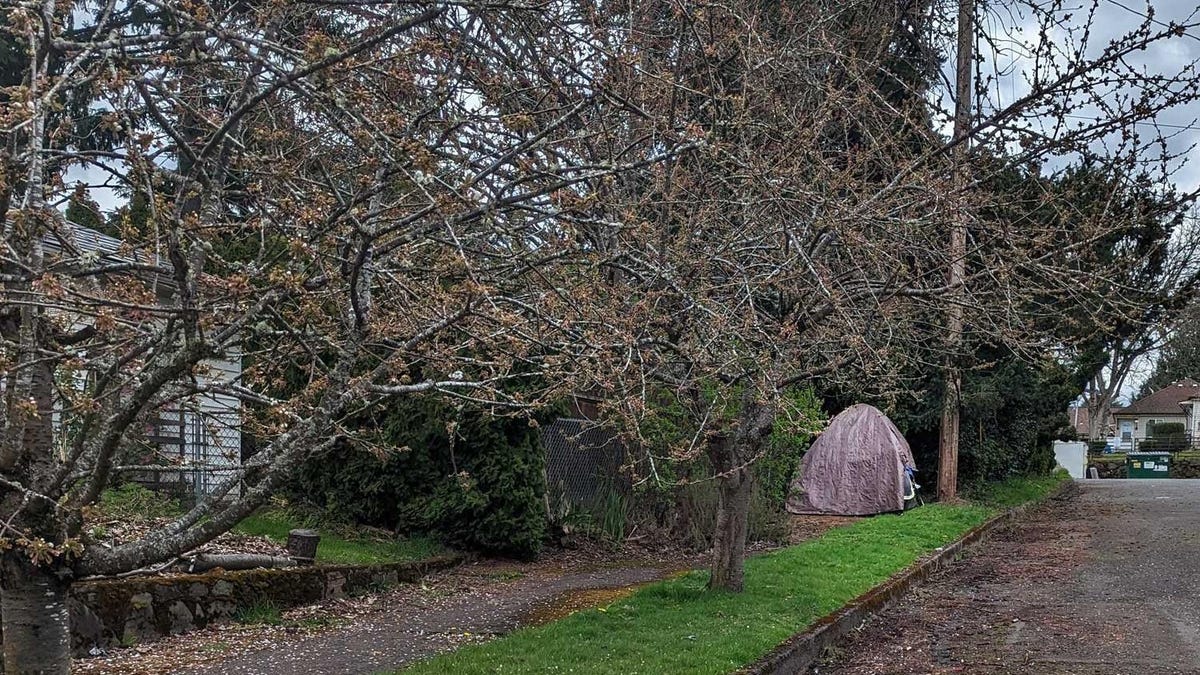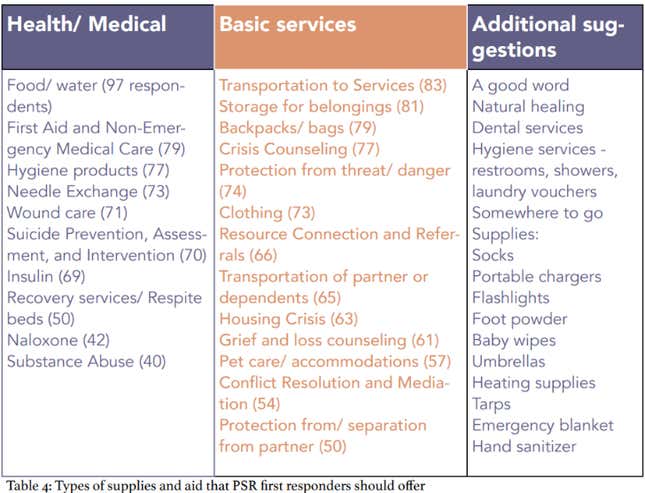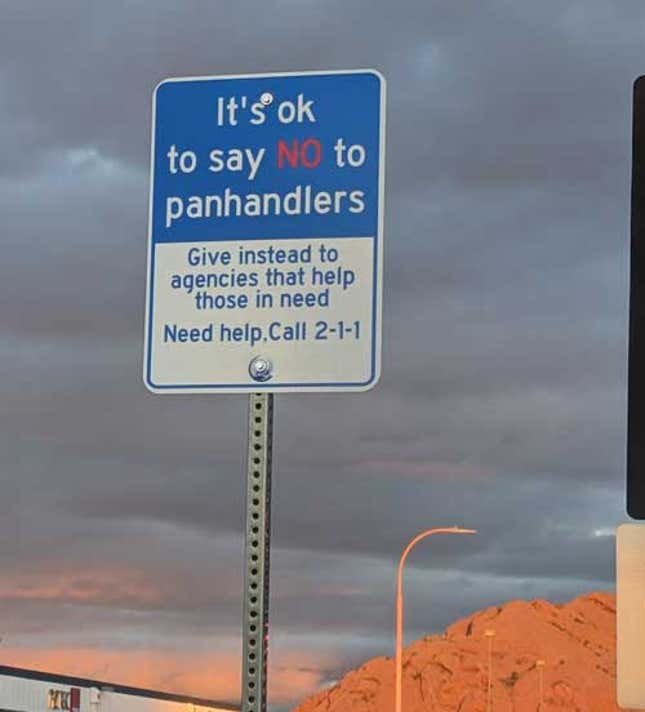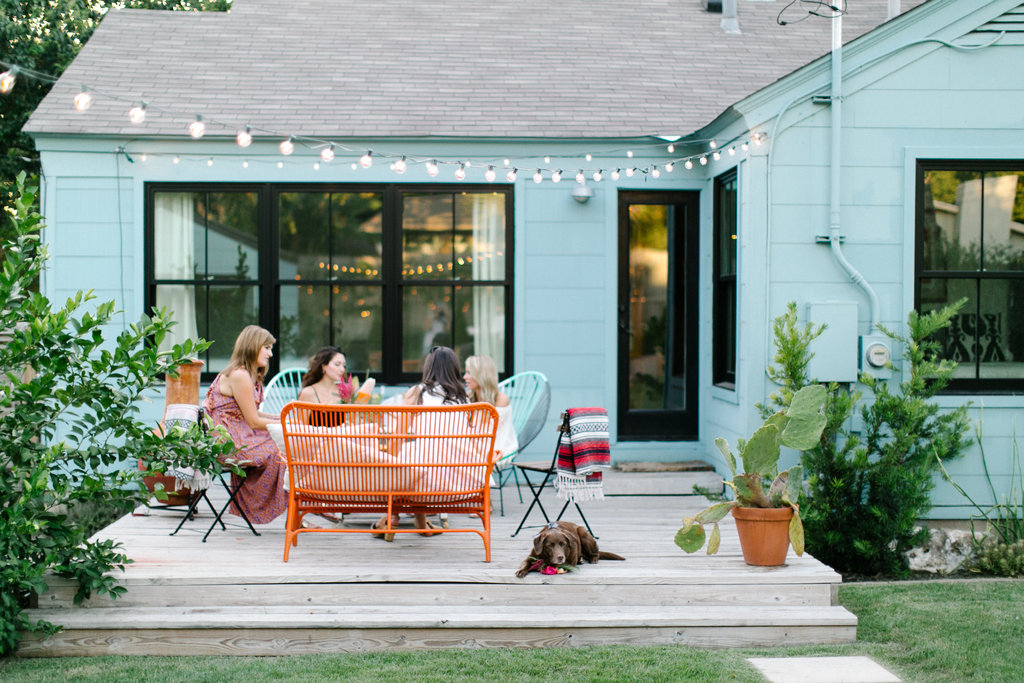Why You Shouldn’t Call the Police on an Unhoused Person (and What to Do Instead)
People think we’ve got the market cornered on houselessness here in Portland, Ore., but traveling across Idaho, Utah, and Arizona this winter helped confirm that this is not a uniquely West Coast Thing; it’s endemic. Houseless folks make people...

People think we’ve got the market cornered on houselessness here in Portland, Ore., but traveling across Idaho, Utah, and Arizona this winter helped confirm that this is not a uniquely West Coast Thing; it’s endemic. Houseless folks make people anxious, which explains how housed people often react. They made me anxious, too, when someone camped on my sidewalk for the first time. My anxiousness embarrassed me, so I became curious where it came from.
That curiosity led me to a series of experiences trying to help people who were experiencing houselessness, working with mutual aid agencies, government services, and nonprofits. I don’t have all the answers, but I have developed personal policies that help guide my actions now. They are imperfect, and always evolving, but here’s what I’ve learned along the way.
People without houses remind us that we could easily become houseless, too
Sixty-three percent of Americans live paycheck to paycheck, we have very little safety net in America, and we are currently in the process of taking more of it away. It’s a common perception that “there are services,” but in order to understand how access to those limited services works, you need to try to help someone access them.
Think of anytime you’ve had to deal with your health insurance, or the cable company, or the IRS, and how frustrating and time-consuming that was. You probably still got it done, but it was clear who to call, and you did it from the quiet comfort of your home or job, on a cell phone that had unlimited minutes and was charged, in a warm place, with a fridge and pantry nearby.
Now try to reimagine doing that while trying to keep your body warm enough not to shiver, in clothes you’ve been wearing for days, with traffic noise around you, on a phone you’ve borrowed with no place to charge, while trying to figure out how you’ll get your next meal. You probably haven’t had decent sleep in a long time because of the cold, or anxiety about security, or the police making you pack up and move suddenly, without anywhere for you to go.
Those services are likely going to say there’s a waitlist and ask how they’re going to get ahold of you when the time comes. They might offer that you’ll have better luck coming in, but they offer no way to get you there, and doing so means breaking down everything you own and bringing it with you—and if you leave where you’re at, you’ll lose your spot. Your things are all you have left in the world and are necessary to survive. The challenges against you are often unthinkably hard even if you have the emotional bandwidth to get started.

Photo: Staff
People without houses are still people
Houseless folks are not “homeless.” They have space that is theirs, even if it’s simply the small space they’ve carved out, and it moves. They have relationships with the people around them, they form communities, neighborhoods, just like you do. What they lack is the deed or lease and the appearance of a “house” the way we have come to think of it. As proof, what is the difference between VanLife and houselessness except some interior design and a TikTok account?
The trope is that people without houses are lazy, but following the circumstances they must live in everyday, they might be the hardest working people in the world because just surviving requires an inordinate amount of physical and emotional effort.
Rachel Hermansen, organizer of an ad hoc Mutual Aid network in Oregon they sometimes call Burrito Bloc explains: “You’re on foot, looking for resources, not everyone is going to have access to transportation. There are so many barriers when an individual is houseless and wants to get out of it. Not having a state ID is a huge barrier.”
Kaia Sand, executive director of Street Roots (part of an international network of street papers that creates income opportunities for houseless people while focusing their investigative journalism on systemic inequities like the criminal justice system, evictions and issues around policing) explained how simply not having to get groceries daily, since you have no ability to carry items or keep them cold, affects your daily workload. “You save so much time only going to the store once a week. The exercises of survival are so time-consuming; houseless people wait six hours for a shower. There’s constant effort trying to survive.”
Hermansen explains that while larger camps of houseless people intimidate local residents, they help by lessening the load on each individual by helping care for each other.
She stressed how overlooked it is that many houseless people are actually employed. “They’re struggling to get transportation to their jobs, to get clothing for work.”
Many Americans, though employed, are simply priced out of housing, or lack the credit, employment history or references to be approved for regular housing, or have a criminal record simply because of their lack of housing.
Acknowledging that houseless people aren’t simply “lazy” would also mean it’s not just hard work keeping us from becoming houseless, and it’s less within our control than we like to believe. Another way to think of “luck” is that no matter how hard we’ve worked, circumstances have worked in our favor.
Why you shouldn’t call the police
Simply put: Do not call the police. Candace Avalos, a community leader in Oregon, says, “I don’t think you should call the police on a houseless person camping on your street. The police can’t solve the problem; they don’t have the tools.”
The police are not trained for dealing with people who are houseless and have shown time and time again that they are one-note in their solutions: violence. Even if you do not wish someone to be on your street, you have to actively wish them harm to call the police. Avalos points out, “If they’re just existing and not bothering anyone, you shouldn’t be calling anyone.”
Second, they do not solve the problem. Police will simply sweep the people on your block. They don’t tell them where they can go (except possibly a shelter, which isn’t a fit for everyone), or offer to get them there. Frequently, they toss out many of their belongings, or make false promises about holding the belongings in storage. At the least, someone will have to pack up their whole existence and trudge back into the unknown without someplace to go. Each time that happens, it’s adding another layer of trauma to someone who has likely already experienced unimaginable challenges. Even if you’re simply not sympathetic and just want houseless people gone from your immediate view, police provide a temporary, at best, solution.
“The criminalization of homelessness has been an enduring problem,” Sand says. She explains how a cycle is created: police encounter a houseless person, check to see if they have a warrant, and if they do, it’s likely related to their lack of permanent housing. So they’re arrested, creating another ding on their record, and each of those dings makes it harder to get housing or employment in the future. At the same time, an enormous amount of police resources are going to issues around homelessness, crimes like trespassing and unwanted persons, that wouldn’t exist if people had housing. As an example, last year, half of all arrests in Portland, Ore. were of unhoused persons.
The exceptions, Hermanson suggests, are if “there’s an immediate threat of harm to others or threat of loss of life. If there are deadly weapons, threats being made, with no possibility for de-escalation, I could see police being called.” But she cautions: “If the individual is in a mental-health crisis or threatening to harm themselves, I don’t think the police are the best to call there.”
Sand goes further: “When someone is in distress, the last thing they need is multiple officers with guns standing over them; it only escalates the situation.” In 2019, Street Roots commissioned a study of unhoused people in Oregon, conducted by houseless people. The study found that “regardless of how they rated their interaction, numerous respondents discussed being treated rudely rather than with politeness and respect” by police.
Sand recounted two stories. “There’s a man who was a vendor who died last year, a Black man suffering from mental illness, so sometimes he would shout. He would say, ‘when my brain itches, the last thing I need is a badge and a gun, what I need is a calm, soothing voice.’ That description is helpful to show that when you send out a first responder whose job isn’t de-escalation, bringing down the stress, you’ll get the wrong response. When we’re deescalating, it’s one-on-one; no one feels trapped.”
How to approach a houseless person
“If you genuinely want to help the person, then if you feel comfortable, you should talk to them directly and ask what they need,” Avalos says.
I start by introducing myself. I stand as far back from someone’s tent as I would from their front door on a porch. This is their space. I do not want to appear threatening or scared. Introducing yourself is a sign of respect. “Hey. I’m Amanda. I live around the corner; I just wanted to introduce myself. You don’t have to come out if you don’t want to, but I’m about to have some dinner and wondered if you’d like some.”
According to the Coalition on Homelessness, you can open conversations by simply asking about their day or talking about the weather. Treat them as you would a neighbor.
“If you’re able to learn their name while they’re not distressed, it’s so helpful when they are distressed,” Sand says. “People can seem like they’re in a different state of mind, and you call them by name and they respond. When someone is in crisis, you don’t want to block or surround them. It’s terrifying for people when we feel trapped. Treat yourself like an open door, so someone can leave. Show your hands, pivot your body, avoid putting your hands in your pocket. The other thing that’s really helpful is to take breaths. We’re such social creatures that we mirror each other.“
Sometimes, when I talk about this, people ask if it’s dangerous, and admittedly, when I first started going to camping sites or approaching people, I was scared. Again, I tried to dig into why I was scared. Are these experiences really more dangerous than approaching anyone on the street or on their porch? In my experience, they’re not. I’ve watched thousands of TikToks of people approaching every kind of stray or wild animal with less fear then they approach human beings; we have it within us.
“I personally feel comfortable approaching most any individual,” Hermanson relayed. “In our neighborhood, we’ve just gone over to someone’s tent and introduced ourselves. ‘Just checking in to see if you need any food or supplies today,’ and try to develop some camaraderie; let them know that there are some community members that are safe and can provide support.”
The only signs that would make her think twice echoed how you’d treat your housed neighbors. “If someone is clearly having a mental health crisis, that’s a situation I’m going to avoid. If an individual says ‘no’ to support, you don’t want to push.”
People know what they need best, and it takes a little to get over your preconceived notions of what they should want. Asking what might be helpful to them or what they might like creates an easier path than “what do you need,” because a lot of people in this position are working their hardest not to be a burden or appear needy. Just offer to fulfill what they asked for if you can, even if it’s not what you might want in that situation or think they need. When I’ve had a shitty day, I probably need to do some activity to get my endorphins going but what I want is ice cream. It really isn’t different.
After working with mutual aid groups, I now specifically mention a few things. “Hey, can I charge your phone or charger for you? Can I do some laundry for you? How are you for socks, underwear, and shirts right now? Would it help if I had some for you?” The answer is often yes. Because neither of you can predict how quickly they may need to move, I also let them know exactly where I’m going with their things. “I’ll bring these back in three hours, but I’m that house with the blue mailbox if you need them sooner.”

The Coalition on Homelessness offers tip sheets that explain we can go further by offering water so they can wash up, letting them know what day trash service is and offering trash bags, and offering to call resources.
How to help connect them to services
It’s helpful to understand what services exist in your city before you encounter someone who needs them. Let’s say you found someone tomorrow who is open to assistance: What would you connect them to? Most cities have shelters, but that doesn’t mean they have beds available, or are accessible to everyone. They’re overcrowded, loud, and often unsafe. There’s a reason many people choose not to use them, particularly if they have sensory issues or past trauma. Shelters are not open during the day, so residents still need to find a place to go early in the day, then line up again at night, so it’s often more efficient, safer, and will net you a better night of sleep to tent than choose a shelter.
What exists beyond that? Prioritize: Find the places that offer immediate types of help. A place to sleep, food to eat, and medical services. Find your closest free clinic, your closest food pantry, and your closest shelter. Now move onto the long-term resources, because this is where you can be the most helpful. Getting someone on the radar of city or county services is the key to long-term housing, social services, advocates, job programs, and counseling. Sand suggests Googling “continuum of care, city name.” Don’t Call the Police has a great list of services by city. Don’t just offer these resources to the person you’re talking to, offer to help make the calls.
Hermanson suggests finding someone who is already working with unhoused neighbors, and connecting with them, if you’re anxious going it on your own. She started with the Portland Mutual Aid Network, a non-profit, and then branched out to form her own collective that distributes meals and care kits. When houseless people ask who she is with, she replies, “”We’re just your friends and neighbors.”
Talk to your neighbors. Communities can help prevent houselessness by being another piece of the social net, but they can also be a part of the solution. If you trust your neighbors, you can let them know about the person. (“That’s Henry. He’s about 50, loves to talk, and could use some socks.”) You can work together to ensure they have meals or a place to drop their trash. You can also ask them to not call the police, although discussing this before it’s an issue is ideal. Hermanson offered this prompt to neighbors who might be anxious, “Hey, will you call me before you call the police? Let’s see if we can find a solution for everyone first.”
Keep a resource sheet of the alternative services offered so you have it when you need it. Once you’ve formed even a basic relationship with someone, you can ask permission to talk about services and if they’re interested in your help. “Hey, would you be OK if we talked a little about what resources there are? I’d like to help you, if you’d like.” If they are open to it, ask what they’ve tried before. Don’t discount their experiences; they aren’t yours. Ask if they think it might be helpful if you tried to call or help with applications. Never assume; always ask permission.
Once you’ve started trying to help someone obtain services, you’ll understand how absurdly hard it is, and it will completely shift your world view of the idea that houseless people are just stubborn and refuse the help out there.
Understand the difference between structural help and mutual aid
The social net is made up of different types of help: government organizations like the Department of Housing at the county or city level, and the Department of Economic Security (sometimes just called “Homeless Services”).
Next, there are non-governmental organizations (NGOs) and nonprofit organizations, which are privately run. Each city has different organizations, which include food pantries, religious groups that offer services, independent shelters, clothing closets, job training, or groups like Fresh Start.
Lastly, it’s vital to understand what mutual aid is, and why it has become very popular: Simply, mutual aid is when someone asks for something and someone else just gives it. You don’t challenge why someone needs it or if that’s really what they need. It’s immediate. Someone needs $500 to get their car fixed, and people who want to help Venmo them money toward the $500. Someone is hungry, and you give them a meal. They need a hotel room for the night, and you help pay for it.

It’s also OK to acknowledge that while 211 may be able to help someone get on the path to long-term resources, only cash is going to solve the immediate problem of being hungry and lacking a place to sleep today. You can do both.Image: Amanda Blum
These three arms sometimes malign each other for a variety of legitimate reasons. Traditional nonprofits can be steeped in structural racism, too many rules, and too much overhead; and mutual aid requires some blind faith. But really, these three kinds of help work best in concert. When I was in Arizona, I started to see signs that asked people to stop giving out cash and instead refer houseless people to 211. But if someone is hungry right now, a referral number isn’t going to put food in their belly today. If someone is on the street, a referral number is going to get them on a path to help, but won’t give them a place to sleep tonight. But mutual aid is unlikely to find long-term housing or offer advocacy services from someone who knows the system.
Mutual aid can come in so many forms: It can be helping connect someone to a job, or offering to help them practice interviewing, looking over a resume, or just dropping off a meal, doing laundry, or offering a place to shower. It can be sitting and having a conversation with someone and learning their life story. There are mutual aid groups in every city, and connecting to them and volunteering is going to give you so much insight into the system.
In the end, none of these suggestions are going to cure houselessness—that requires a tremendous restructuring of the social system that created the problem. However, I know that every encounter we have with houseless folks can only result in one of two outcomes: One where we make someone’s hard life infinitely harder, or one where we make their lives even a fraction of a percentage better for a moment. Choose the latter.

 Lynk
Lynk 
































